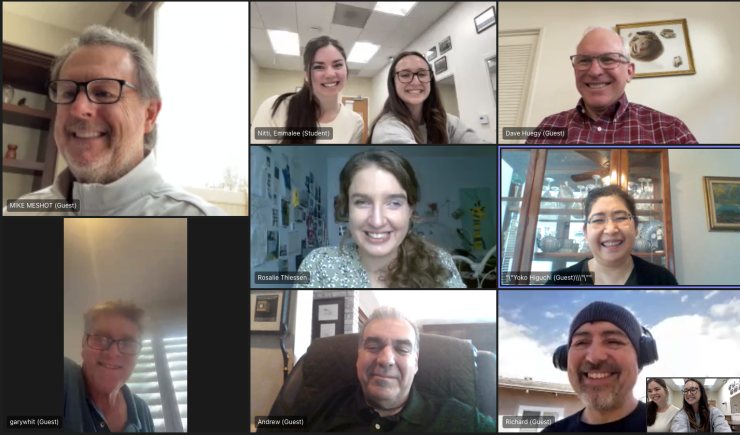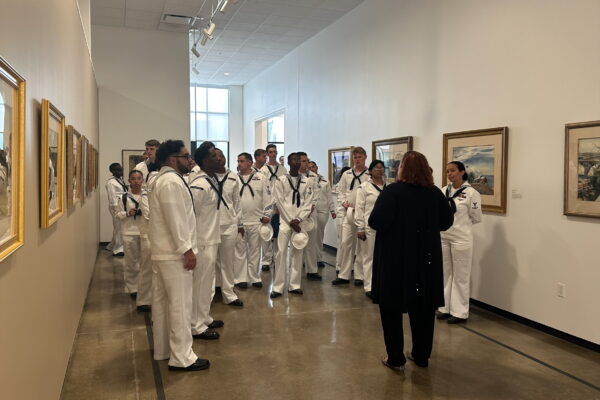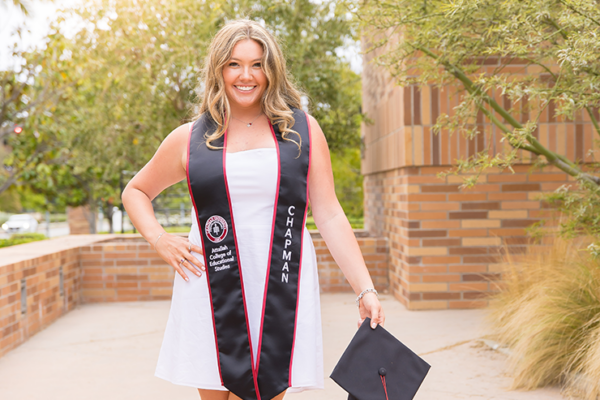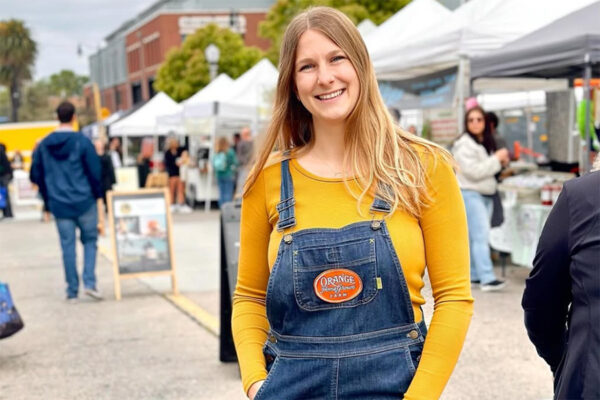A book club meets online to discuss their latest read, “Orphan Train.”
They first launch into a lively discussion about the previous day’s Super Bowl. Eventually, one of the group’s student facilitators, Emmalee Nitti (MS ’23) asks participants to jump into questions about several chapters of the book.
“Sounds like business,” quips group member Mike Meshot.
When they get to chapter 10, group members are asked what makes them appreciate home.
“When I had a stroke, I was in the hospital and then rehabilitation,” says group member Andrew Hatzis. “It was like a month. I was like, ‘I can’t wait to be home’ – but you have a hard time relating.”
Accessible reading
In addition to offering literary community, the group serves another purpose: improving quality of life for people with aphasia, a language disorder often caused by a stroke or head injury.
Aphasia is one of the challenges addressed by the Adult Learning Lab at Chapman University’s Crean College of Health and Behavioral Sciences.
The book club, which was started in 2019 by Zina Rhee of Crean’s Department of Communication Sciences and Disorders, uses aids to make books accessible to those with aphasia. Rhee heard about the Aphasia Center of California’s Book Connection program in 2005.
“Ever since then I’ve really wanted to start a group like that, but never had the opportunity until I came to Chapman,” she says.
When the pandemic started, the group was “a lifeline because people were already isolated,” she says. “I was really grateful we had this in place and these connections we could maintain.”
Eight of the nine group members had a stroke and the other person had a traumatic brain injury. Aphasia can affect auditory comprehension and expression, reading comprehension and writing and speaking ability.
By the time people come to the group, they’ve already exhausted whatever treatments and outpatient therapy are covered by their insurance, Rhee says. The group, which is open to anyone as long as they want to attend, fills a need in the community.
The patient care framework that students learn includes addressing life participation, in addition to a person’s impairments, Rhee says.
“They also look at, are they participating more in conversations, are they reading books more for fun,” she says. “The idea is that by slowly increasing their participation, it decreases their disability.”
Laughter and discussion
Rhee chooses a few books the group might be interested in, then they vote on their next read. Each book has “reading ramps” – a bulleted summary of each chapter – and worksheets for levels of ability.
She says everyone who joined the group used to read for fun before stroke “and weren’t doing it anymore.” Some members weren’t able to return to work after their stroke or injury, so the group gives them a role to play and a way to support each other and help the graduate students.
Those students ask to run the group each semester, Rhee says. Nitti says the group is the highlight of her week.
There is “a lot of laughing and interesting discussions,” Nitti says.
“The participants are all incredibly supportive and respectful of one another, which helps in creating a really inclusive environment where everyone can participate in a way that they feel most comfortable,” she says.
Most group members have been coming for a while and have a bond, she says. They even bonded over a book they all ended up hating, Rhee says.
“They have all been so open and willing to share about their lives and personal connections/shared experiences with the book,” Nitti says.
The group had an end-of-semester party in December, meeting in person for the first time since the pandemic started. Participants were thrilled to see each other and one traveled to the party from Temecula, Rhee says.
Organizers aren’t sure about resuming in-person meetings, she says.
“The tricky thing about groups is they’re much better in person but provide more accessibility by being online,” she says.
She tells students to check in with someone if they don’t attend a meeting.
“It’s important that someone will notice if they’re not there,” she says. “It’s part of the big picture of what we’re trying to accomplish through the group.”
For more information about how Crean is advancing health care, visit Community Outreach | Chapman University.




